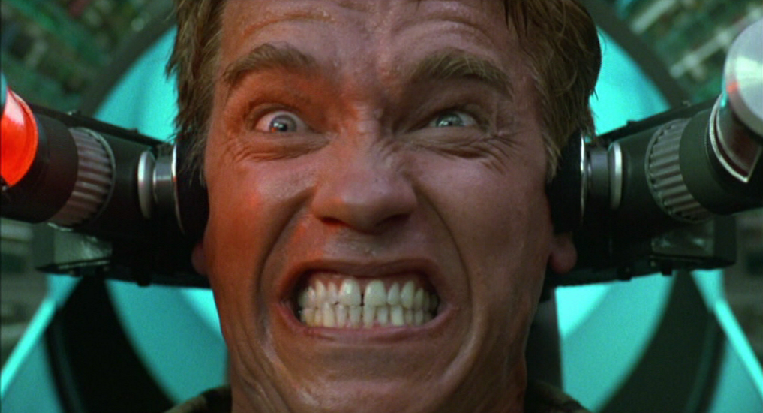There's definitely something strange about seeing Klaus Kinski play a character that smiles and a character that is in love with another human being. After all, virtually every other character Kinski played was a frothing madman. But here he plays Fitzcarraldo, a man of passion and warmth, a man who loves opera instead of fear and death.
The opening scenes set the character up superbly. Fitzcarraldo emerges from the darkness as he struggles to get to the opera on time. He's rowed two days and two nights to see the show (after the motor on his boat broke down) but once he gets there the show has already started and he's denied entry. Meanwhile horses are fed expensive champagne and there's a large group of locals congregated outside the front of the house. It's obvious that Fitzcarraldo, like the indigenous population, doesn't belong in such opulent surroundings. He's an outsider. However, after some gentle persuasion, he gains entry and gets to watch the rest of the show while standing at the back of the theatre.
But Fitzcarraldo isn't content to stand at the back forever. Inspired by his love of opera and the way the wealthy claim this form of artistic expression entirely as their own, he decides that he's going to build his own opera house. He's going to do it for the local children that listen to his records and for the pig that listens to them, too.
One of my favourite scenes in the film is when Fitzcarraldo climbs to the top of a church and screams from the belfry that he wants his opera house. He's like a big kid demanding French fries and ketchup for dinner. But it's endearing too, and I love the manic way that Kinski starts ringing the bell as he demands his opera house and as he says that he wont let anyone come into the church until he's got it.
Well, his church siege doesn't last, but his passion doesn't die. He's going to make the money required to build his opera house come hell or high water. But it isn't an easy task and he has to put up with rich businessmen flashing their wealth in his face – one man feeds money to his fish just to illustrate how much he has. But all the doubting and the all the taunts just make him more determined. When he buys a piece of land rich with rubber trees, and when the local businessmen start placing bets on when he'll fail, he says that he'll move a mountain, and because it's Kinski, and because Kinski is intense to an absurd degree, you believe him.
But you also believe him because Herzog is directing the film. If anyone can move a mountain, it's him. And the scene where Fitzcarraldo and a tribe of Indians drag a steamboat up a mountain really has to be seen to be believed. It's surreal, it's beautiful and it's a fantastic way of illustrating what an uphill struggle we have when we try and make our dreams real. It's a difficult process, and a painful one too, but it's also incredibly worthwhile.
Another scene I like is when Fitzcarraldo surveys the land he's bought from a gantry high up in the trees. He looks down upon the land he wants to exploit (money from the rubber trees is going to pay for his opera house) like a god. Again he's like the kid demanding his opera house.
But there are plenty of other great moments in the film as well. I love the bit when Fitzcarraldo and his crew first encounter the natives. They can't see them, but they can hear their drums coming from the jungle. So then Fitzcarraldo plays Caruso and everything goes quiet. And then again Fitzcarraldo surveys the jungle like a god quietly passing through. But then to bring him back down to earth there's the subtly threatening way that an umbrella appears in the river. If he makes a mistake or acts in the wrong way, he's a dead man.
But what I like most about the film is the ending. All through the second half of the film, Fitzcarraldo gets distracted by this insane goal of pulling a boat up a hill so that he can get the rubber trees and make money enough to build an opera house. You kind of feel like he's losing his way – Indians get killed pulling the boat up and he plays up to the Indians' idea of him being some sort of god. But then just as he's got the boat over the hill and he's in sight of achieving his goal, everything goes wrong. After a celebration, and in the dead of night, the boat is cut loose and it flows down the river and into the rapids with him sound asleep in it.
What follows is an insane piece of film-making – Herzog actually filmed Kinski and his crew on the boat while going through a treacherous stretch of river – and the boat crashes into cliff walls and spirals totally out of control. It seems like all hope is lost; they might die and they have no rubber. But somehow they survive unscathed (unlike the film crew who got injured filming the scene). And then Herzog pulls something of a masterstroke. Instead of having a despairing ending with a man defeated, he has Fitzcarraldo fulfil his dream, albeit on a smaller scale. He has Fitzcarraldo load up his battered boat with opera singers and musicians and he then has them take their music up river. It's a beautiful scene, and Kinski's large smile as he puffs on a massive cigar, and as he waves to the local children and the pig, is the icing on the cake. He climbed a mountain, he fulfilled his dream of bringing opera to the jungle and he didn't lose himself in the process. Who could ask for more?


